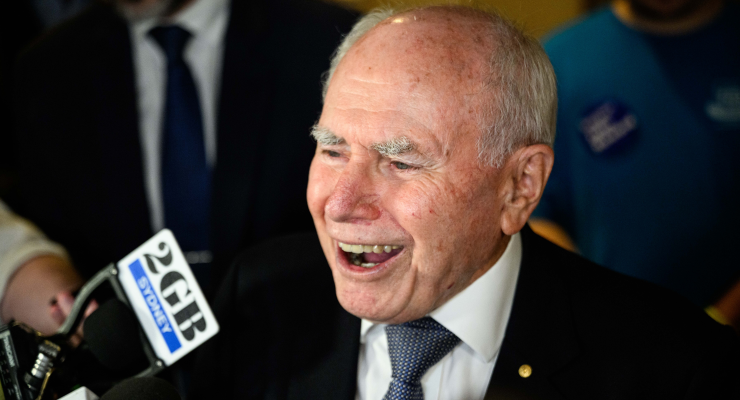
John Howard’s legacy lingers on, in sometimes surprising ways. His ghost has just thrown a spanner in the works of voluntary assisted dying (VAD).
VAD — where a person of sound mind wishes to end their life because of terminal illness, and is lawfully assisted to do so by medical practitioners after ticking a long list of precautionary boxes — is legal in all Australian states. NSW was last to join, with its law coming into operation on November 28. It is not yet legal in the Northern Territory and Australian Capital Territory, although the ACT has a VAD bill before it.
The states’ laws have differences, some significant, but the philosophy and basics are common: they reflect, and respect, the human right to autonomy.
Suicide is not a crime in Australia, although even that’s relatively recent (NSW abolished the crime of attempted suicide only in 1983). As I wrote a few years ago, it’s unclear whether the law’s basis for ever frowning on it was theological or secular. Interestingly, I rather presciently noted that “the distinction between suicide per se and voluntary euthanasia is only one of logistics”.
Which is exactly what Justice Wendy Abraham of the Federal Court concluded last week, in finding that the legal definition of “suicide” includes VAD. The judge had been asked to find otherwise by Nick Carr, a Victorian doctor who was worried that he might be committing a federal crime if he provided assisted dying support to his patients via a telehealth (online) service.
The problem is the Commonwealth criminal code, which makes it a serious crime to transmit or make available material over a carriage service (phone line or internet) that “directly or indirectly counsels or incites committing or attempting to commit suicide”. This directly cuts across Victoria’s and other states’ VAD laws that require a person contemplating VAD to be provided with information to assist them, including detailed explanations of exactly how the process of dying will take place.
The federal law doesn’t define “suicide”. Carr argued that it should be interpreted as not including the ending of a person’s life lawfully in accordance with state VAD laws. His case boiled down to the notion that the distinction should be drawn because “committing suicide” isn’t just the taking of your own life but doing so wrongfully.
That’s problematic for a couple of reasons, not least because we’ve long since stopped treating suicide as a culpable act (accepting that religions almost all still consider it so, but religious doctrine is not law). More important is the reason why this particular federal law exists at all. It was made in 2005 by the Howard government during its frenzy of post-9/11 national security legislating. One of Howard’s less-highlighted specialties was his constant search for ways to extend the Commonwealth’s reach into areas traditionally (and constitutionally) reserved to the states — in particular, over people’s private activities.
Howard was a moralist at heart, far more than he was a conservative. It was his idea to change the definition of marriage to stipulate that it could only be between a man and a woman, simply because he was anxious to prevent same-sex marriage.
As Abraham picked up, it’s clear why Howard’s government asked Parliament to make this very specific law criminalising assistance to people wanting to commit suicide. It wasn’t — as Carr submitted — just about “preventing vulnerable people from being encouraged or pressured” into it.
Existing customs regulations already prohibit the importation of “suicide kits”. You may recall that VAD had been legalised in a few other countries for a while, and that there were vocal local and overseas advocates such as Dr Philip Nitschke pushing the VAD agenda inside and outside the law. That was the context for this law: to further clamp down on the development of public interest in, and appetite for accepting, the concept of voluntary assisted dying.
It’s not like there was ever a serious problem with suicide cults in this country, so the only rational justification for federal legislation was to try to forestall VAD from gaining a foothold. Therefore Abraham’s decision is entirely uncontroversial. Not only was VAD always just one way of committing suicide — and still is — but actually the Commonwealth law Carr was worried about didn’t accidentally get in the way of the state VAD laws. It was designed specifically to do so, leveraging the Commonwealth’s constitutional power over telephony.
The problem was already known, and some states have been asking the feds to get rid of this law for a while. Attorney-General Mark Dreyfus said in the aftermath of the Federal Court’s decision that he would “consider” it; meanwhile, independent MP Kate Chaney, with the support of fellow independent MP Monique Ryan, will introduce a private member’s bill to exempt VAD from the definition of suicide.
Howard will be quietly chuckling to himself. The long sweep of progress will get us there eventually, but we’ll continue to step on his carefully laid landmines along the way.
For anyone seeking help, Lifeline is on 13 11 14 and Beyond Blue is 1300 22 4636.
Should the A-G get rid of this law? We want to hear from you — especially while our comments are closed due to our website upgrade. Send us your thoughts on this article to letters@crikey.com.au. Please include your full name to be considered for publication. We reserve the right to edit for length and clarity.








Crikey is committed to hosting lively discussions. Help us keep the conversation useful, interesting and welcoming. We aim to publish comments quickly in the interest of promoting robust conversation, but we’re a small team and we deploy filters to protect against legal risk. Occasionally your comment may be held up while we review, but we’re working as fast as we can to keep the conversation rolling.
The Crikey comment section is members-only content. Please subscribe to leave a comment.
The Crikey comment section is members-only content. Please login to leave a comment.